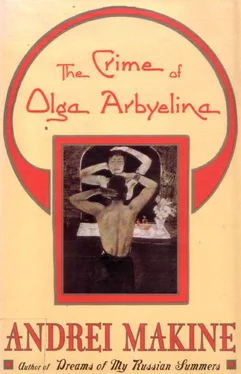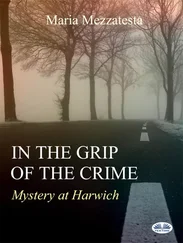She stood up and her hand retained the sensation of the shoes growing gradually broader. "Fourteen. He's fourteen…," she caught herself murmuring softly. The face of the adolescent whom she had recognized as her son was very deeply embedded in her eyes. She perceived in it the invisible mutation linking the face of the child to that of the young man. Everything in his features was still malleable, everything still had the softness of childhood… And yet he was a new being. And almost as tall as she! Indeed, in a few weeks he would be the same height… So a whole period in her son's life must have passed unnoticed!
She put the shoes away and went out into the darkness again. "I didn't notice him growing up… He was an endlessly silent, discreet child… An absent child. When his father left it froze him at the age he was then. And after that there was the war, those four empty years. And, above all, there was his illness: I paid more attention to a scratch than to him growing three inches. And his shy independence. And his isolation. And this benighted spot, this Villiers-la-Forêt…"
The words reassured her. She prolonged their exaggeratedly reasonable flow because she did not know what she was going to be able to do when they dried up. She simply did not know. She was walking in the dark on the grassy slope that lay between their house and the river. And whispering these explanations that, she sensed, would never express the essence of the bond between them, her and her child. The branch of a willow tree suddenly checked her. A branch that stroked her cheek with a caress that felt alive. Olga stopped. There was the willow with its silent cascade of branches. In their net a few stars. The reflection of the moon in the hollow of a footprint filled with water. The fresh, nocturnal scent of the reeds, asleep at the water's edge, the scent of the wet clay…
"Suppose I stayed here? Not to return, not to go back into the life of that house… To walk endlessly on this silvery grass…" But her footsteps were already leading her back toward the door. As she climbed the little wooden steps she pictured again the strip of freshly dug earth along the wall where she had been gardening scarcely an hour earlier. That time now seemed remote to her and filled with a paradisiacal happiness and simplicity.
In the hall, hooked onto the coatrack, hung her son's jacket, one of its sleeves screwed up comically short. Olga gave it a rapid tug, as if discreetly to correct a blunder. No gesture could have been more innocent…
She pressed the switch and put her hand to her mouth to stifle a gasp, so reduced in size did the interior of the kitchen seem to her. The figure of the young man, even when invisible, imposed itself on the walls and the furniture, shrinking them, as in those bad dreams where you are propelled into a familiar apartment, which contracts as you watch and ends up like a little house for the figures on a music box… Indeed, halting in the middle of the kitchen she felt as if she were examining the inside of a dolls' house, whose smallness, at once enchanting and unnatural, was obscurely menacing. Even the little saucepan on the range looked smaller than before and at last revealed its true shape-slightly bell-shaped, potbellied.
Olga knew that she would shordy strain off the infusion's brownish liquid and throw away the sediment of the flowers. She turned on the tap, preparing to wash her hands, but at that moment her eye Ht upon the orange crayon that had been slipped as a bookmark into the notebook left on the table by mistake. She took it out, and studied the color. "No action could be more innocent," she repeated in a whispered echo. And swiftly, without her being able to offer the least resistance, the fragments of the mosaic, seen when she had her attack of giddiness, began to come together: a nervous hand hovering over the range; the cat in the first snapshot watching a woman asleep; the open door through which the animal had slipped in; the young man who from now on would be living under the same roof as she… She felt a great mass of slimy, lumpy skin swelling in her head. The reptile… The mosaic coalesced more and more quickly: the hand above the infusion; her deathlike sleep on certain days; the child who was as tall as she was; the orange crayon… One more round and these fragments were going to become fixed in an inescapable certainty.
She glanced at the range. The flowers that had been steeped for too long, had turned brown: under a shallow layer of liquid they resembled the damp skin of a hunched beast, the same one that, grotesquely bloated, was tearing at her brain. The mosaic began its round again: the hand; the young man near the range; the sleep…
Olga seized the little vessel and with a febrile gesture poured the infusion into the big bowl and gulped it down… The mosaic vanished. The reptile in her brain died noiselessly, thrusting a multitude of red needles under her eyelids. The kitchen resumed its normal dimensions. She felt pathetically relieved, as if she had just convinced a skeptical interlocutor.
Walking along the corridor, she noticed a light inside the book room. A lamp on a narrow table squeezed between the sets of shelves had been left switched on. Her eye was caught by an engraving on the page of a large old book that had been left open. It was one of the volumes of the zoological encyclopedia her son liked to leaf through. She leaned over the engraving and read the caption: "A boa constrictor attacking an antelope." The engraving, punctilious in its realism, had an unexpected effect, like all excesses of zeal. For even though the smallest tufts of hair on the antelope's spotted hide were visible, its whole aspect was evocative of a vaguely human form: the expression of the eyes, the position of the body surrounded by the coils of the gigantic snake. As for the boa constrictor: its muscular body, covered in arabesques and prodigiously thick, resembled the broad thigh of a woman, a rounded leg, indecently plump and clad in a stocking ornamented with patterns…
She sat down to study it better. The engraving amused her: the boy certainly did not suspect this double vision of boa-woman. It was reassuring. So she was wrong to have been so alarmed just now. As long as all he saw was this huge, gaudy snake…
As she looked at it the picture began to sway slowly. The tiredness was pleasant, soft, as it touched her eyes. She wanted to lower her lids, to go on enjoying these peaceful moments. Her eyes were already closing of their own accord. Still believing it was no more than the lassitude of evening, she tried to shake herself but only succeeded in provoking this last thought: "I must get up; my hands are still covered in earth, I shall make the book dirty…"
Sleep rapidly overcame her with calm, irresistible violence, mingling with the pleasant, delicate aroma of the old pages. Pages you smell with closed eyes, inhaling deeply.
It was the last few knocks on the front door that woke her. That type of insistent hammering into which people annoyed by waiting weave a kind of drumming melody, in the hope that the variations in the rhythm will attract attention.
She leaped up from the chair, trying to make sense of her immediate surroundings: the dazzling sun at the tiny window; the clock with its hands in an odd position, showing almost eleven o'clock; and above all, herself, this woman in a crumpled dress, her hands covered in streaks of earth, a woman turning around in a tiny storeroom, knocking books over and unable to find a mirror…
The hammering rose to a climax with the measures of a military drum roll and fell silent. Olga went out into the corridor then came back and, without really knowing why, closed the volume of the encyclopedia.
"What if they've guessed?" she asked herself in perplexity. "But guessed what?" The absurd notion occurred to her that the others might discover she had concealed her son's age from them. The senseless fear crossed her still drowsy mind that they would suddenly notice the boy was no longer a child, but an adolescent, almost as tall as she…
Читать дальше












